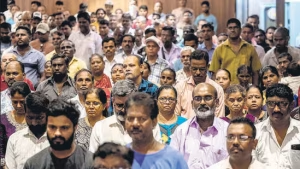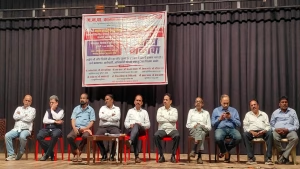Mumbai BMC sanitation workers strike: A Defining Moment for Mumbai’s Future

Mumbai’s municipal waste management system faces unprecedented disruption as the Mumbai BMC sanitation workers’ strike threatens to paralyse garbage collection across the metropolis. The crisis has reached a critical juncture following an overwhelming vote by sanitation workers against the civic body’s ambitious privatisation plans.
The Mumbai BMC sanitation workers’ strike stems from deep-rooted concerns about the Brihanmumbai Municipal Corporation’s decision to outsource waste management operations through a massive ₹4,000 crore tender. This privatisation initiative represents one of the largest civic outsourcing projects in Mumbai’s history, fundamentally altering how the city manages its daily waste collection and disposal operations.
On July 15, sanitation workers delivered a resounding message to municipal authorities when 97% of participants voted in favour of the Mumbai BMC sanitation workers’ strike. This overwhelming mandate reflects the collective anxiety among workers who fear job losses, reduced benefits, and deteriorating working conditions under private management.
The voting process, conducted across various BMC divisions, saw unprecedented participation from permanent and contractual workers alike. The near-unanimous opposition to privatisation demonstrates the unified stance of Mumbai’s sanitation workforce, comprising approximately 28,000 permanent employees and 6,500 contractual workers who form the backbone of the city’s waste management system.
Also read: As BMC floats Rs 4,000 crore. Its sanitation workers threaten to go on strike.
Union representatives emphasise that the Mumbai BMC sanitation workers’ strike is not merely about employment security but represents a broader struggle for workers’ rights and dignity. Theprivatisationn tender, they argue, prioritises profit over people, potentially compromising service quality while undermining job security for thousands of families dependent on municipal employment.
The Mumbai BMC sanitation workers’ strike faces a pivotal moment as union leaders prepare for crucial discussions with municipal authorities. BMC sanitation workers will gather at Azad Maidan at 10 a.m. Today, seeking a meeting with the Chief Minister Devendra Fadnavis. This gathering represents more than a protest; itsymbolisess the workers’ last-ditch effort to prevent what they perceive as an existential threat to their livelihoods.
The timing of the Mumbai BMC sanitation workers’ strike coincides with the municipal corporation’s determination to proceed with the privatisation tender despite mounting opposition. Municipal officials maintain that the service-based waste management system will improve efficiency and reduce operational costs, arguments that have failed to convince the sanitation workforce.
Union leaders have indicated that the final decision regarding the Mumbai BMC sanitation workers’ strike will depend entirely on the outcome of their meeting with senior government officials. This high-stakes negotiation could determine whether Mumbai faces a complete breakdown of waste management services or finds a compromise that addresses workers’ concerns while advancing municipal objectives.
The Mumbai BMC sanitationworkers’s strike emerges against the backdrop of a massive financial commitment by the municipal corporation. The ₹4,000 crore tender represents a significant investment imodernisingng Mumbai’s waste management infrastructure, with promises of technological advancement and improved service delivery.
However, workers participating in the Mumbai BMC sanitation workers’ strike question whether these improvements justify the potential human cost. They argue privatisation typically leads to cost-cutting measures that disproportionately affect frontline workers, potentially resulting in reduced wages, longer working hours, and diminished job security.
The economic stakes extend beyond individual worker concerns. The Mumbai BMC sanitation workers’ strike could have a significant impact on Mumbai’s business environment, tourism sector, and overall urban livability. A prolonged strike would likely result in garbage accumulation across the city, creating public health hazards and damaging Mumbai’s reputation as India’s commercial capital.
The Mumbai BMC sanitation workers’ strike draws strength from a long tradition of labour activism in Mumbai. Sanitation workers have previously organised successful movements to secure better working conditions, fair wages, and employment rights. This historical context provides an important perspective on the current crisis and the workers’ determination to resist privatisation.
Previous strikes by municipal workers have demonstrated the critical role sanitation employees play in maintaining urban functionality. The Mumbai BMC sanitation workers’ strike represents a continuation of this legacy, with workers leveraging their essential status to negotiate better terms and conditions.
The solidarity displayed during the recent voting process reflects the strong organisational capacity of sanitation worker unions. The Mumbai BMC sanitation workers’ strike benefits from established networks of worker representation and collective bargaining mechanisms that have evolved over decades of labour activism.
Despite the overwhelming opposition reflected in the Mumbai BMC sanitation workers’ strike, municipal authorities remain committed to their privatisation agenda. Officials argue that the current system suffers from inefficiencies, outdated practices, and inadequate service delivery that privatisation could address.
The municipal corporation’s stance on the Mumbai BMC sanitation workers’ strike emphasises the need for modernisation and improved service quality. They contend that private operators bring technological expertise, operational efficiency, and financial resources that the current system lacks.
However, the timing and scale of the Mumbai BMC sanitation workers’ strike suggest that municipal authorities may have underestimated worker opposition and the potential disruption to city services. The near-unanimous vote against privatisation indicates that workers view the current proposals as fundamentally incompatible with their interests and aspirations.

The Mumbai BMC sanitation workers’ strike raises important questions about the appropriate balance between privatisation and public service delivery. While proponents argue that private management can improve efficiency and reduce costs, the worker response highlights concerns about accountability, service quality, and employment security.
The outcome of the Mumbai BMC sanitation workers’ strike will likely influence similar privatisation initiatives across India. Mumbai’s experience could serve as either a model for successful public-private partnerships or a cautionary tale about the risks of inadequate stakeholder consultation.
The crisis also highlights the essential role of sanitation workers in urban governance. The Mumbai BMC sanitation workers’ strike demonstrates how frontline employees can effectively challenge policy decisions when they perceive threats to their livelihoods and working conditions.
As July 17 approaches, the Mumbai BMC sanitation workers’ strike represents more than a labour dispute; it embodies a fundamental tension between modernisation and worker rights. The overwhelming vote against privatisation sends a clear message that any sustainable solution must address worker concerns while advancing municipal objectives.
The resolution of this crisis will significantly impact Mumbai’s urban governance model and could influence similar initiatives across India. Whether through compromise, confrontation, or continued negotiation, the Mumbai BMC sanitation workers’ strike has already achieved its primary objective: ensuring that worker voices are heard in decisions that affect their lives and livelihoods.
The coming days will determine whether Mumbai can find a path forward that balances efficiency improvements with worker security or whether the city faces a prolonged period of disruption as stakeholders struggle to reconcile competing interests and priorities.

